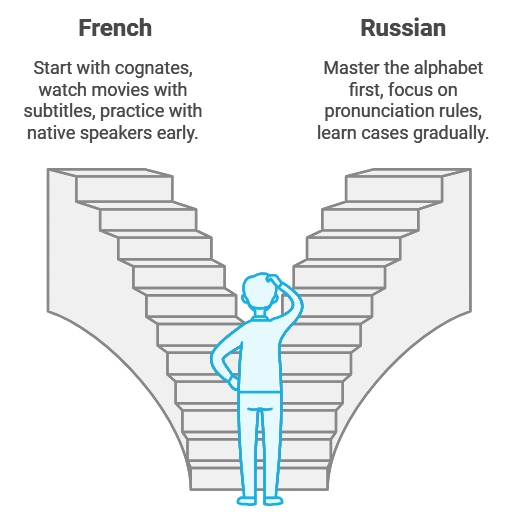Learning French vs Russian: Which Language is Easier?
For English speakers, French is generally easier to learn than Russian. While French requires about 600 hours to reach basic fluency, Russian typically takes 1,110 hours. But hold on – there’s much more to this story than just numbers! Let’s explore what makes each language unique and help you make the best choice for your language journey.
Key Takeaways
- French takes half the time to learn compared to Russian
- Russian has a new alphabet but more logical pronunciation
- French shares 45% vocabulary with English
- Both languages offer strong career benefits
- Learning methods matter more than initial difficulty
Time Investment Analysis
Let’s look at what you’re really signing up for:
| Learning Aspect | French | Russian |
|---|---|---|
| Study Hours to Fluency | 600 | 1,110 |
| Alphabet Learning | None needed | 2-3 weeks |
| Grammar Complexity | Moderate | High |
| Vocabulary Similarity to English | High | Low |
| Global Speakers | 275 million | 258 million |
Learning Progression Timeline
French Milestones:
- Basic (A1): 2-3 months
- Conversational (B1): 6-8 months
- Fluent (C1): 12-15 months
Russian Milestones:
- Basic (A1): 3-4 months
- Conversational (B1): 12-14 months
- Fluent (C1): 24-36 months
Writing Systems: The First Challenge
Here’s where many learners face their first big decision. Which writing system feels more approachable to you?
| Feature | French | Russian |
|---|---|---|
| Alphabet Type | Latin | Cyrillic |
| Number of Letters | 26 + accents | 33 |
| Writing Direction | Left to right | Left to right |
| Special Characters | 5 accents | None |
Grammar Battle
Think French grammar is tough? Let’s compare:
French Grammar Features:
- 2 genders (masculine/feminine)
- 6 main verb tenses
- Fixed word order
- Articles required
Russian Grammar Features:
- 3 genders (masculine/feminine/neuter)
- 6 cases
- Flexible word order
- No articles needed
Real-World Learning Experience
Here’s a typical weekly study plan for both languages:
| Activity | French Time | Russian Time |
|---|---|---|
| Writing | 2 hours | 3 hours |
| Speaking | 3 hours | 3 hours |
| Grammar | 2 hours | 4 hours |
| Listening | 2 hours | 2 hours |
| Reading | 2 hours | 3 hours |
Professional Impact
Both languages can boost your career in different ways:
French Career Benefits:
- 25% salary increase in international business
- Access to 29 French-speaking countries
- Strong in diplomacy and luxury sectors
Russian Career Benefits:
- 20% salary increase in technical fields
- Growing demand in emerging markets
- Unique advantage in energy sector
Success Strategies
Want to make your learning journey easier? Here are proven tips:
- For French:
- Start with cognates
- Watch French movies with subtitles
- Practice with native speakers early
- For Russian:
- Master the alphabet first
- Focus on pronunciation rules
- Learn cases gradually

Making Your Choice
Still wondering which to pick? Ask yourself:
- Need faster results? Choose French
- Interested in Eastern Europe? Pick Russian
- Want more Western business opportunities? French wins
- Love Slavic culture? Russian is your path
- Need more learning resources? French has more
- Enjoy logical grammar? Russian might surprise you
The Bottom Line
While French is technically easier for English speakers, your success depends more on your dedication and learning approach than the language’s inherent difficulty. Think about these factors:
| Factor | French | Russian |
|---|---|---|
| Resource Availability | Very High | High |
| Online Learning Tools | Abundant | Growing |
| Native Speaker Access | Easy | Moderate |
| Cultural Media Access | Very High | Moderate |
Remember, the “easier” language isn’t always the right choice for you. Consider your:
- Learning goals
- Time availability
- Cultural interests
- Professional needs
Ready to start? Pick the language that excites you most – motivation beats ease of learning every time! Whether you choose the romantic sounds of French or the rich complexity of Russian, your success depends more on your commitment than the language’s difficulty level.
Want to know the secret to success? Start with the language that makes you think “I can’t wait to learn this!” rather than “This seems easier.” After all, you’ll be spending hundreds of hours with your chosen language – make sure it’s one that truly interests you!
